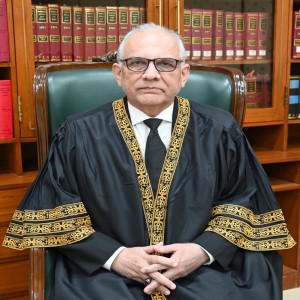ISLAMABAD: Justice Hassan Azhar Rizvi has questioned whether there is any difference between those who commit terrorist acts, collaborate with enemy spies, and ordinary civilians.
His remarks came as he engged with a lwyer during the hearing of an intra-court appeal regarding civilian trials in military courts.
He emphasised that the lawyer should make a clear distinction in their arguments, media reported.
The Supreme Court, under Justice Aminuddin Khan, is hearing the case with a seven-member constitutional bench. Khawaja Ahmed Hussain, representing Justice (R) Jawad S. Khawaja, began his arguments by stating that civilians should never undergo court martial, as military court procedures do not meet the standards of a fair trial.
Khawaja argued that all five judges of the Supreme Court had not agreed on the transparency of the military court trial process. Justice Hassan Azhar Rizvi responded by asking whether there is no difference between those who commit acts of terrorism, collaborate with enemy spies, and ordinary civilians. He insisted that the lawyer should make a clear distinction in their arguments.
Khawaja Ahmed Hussain clarified that he was not defending terrorists or criminals. He further explained that if court martial for civilians were possible, there would have been no need for the 21st Amendment.
Justice Hassan Azhar Rizvi remarked that certain crimes had been included in the Army Act through the 21st Amendment.
Khawaja Hussain argued that had the amendment to the Army Act been sufficient to allow court martial, there would have been no need for a constitutional amendment.
If court martial were possible, the court would have to rule that the 21st Amendment was unnecessary.
He also pointed out that Article 175 had been amended in the 21st Amendment, and there is no provision for bail until the decision is made in military courts.
Justice Hassan Azhar Rizvi remarked that military courts conduct speedy trials, noting that if a decision is made within 15 days, the question of bail becomes irrelevant.
In response, Khawaja Ahmed Hussain argued that in military courts, appeals do not go to an independent forum, and defendants do not have the freedom to choose their lawyer.
Justice Muhammad Ali Mazhar intervened, asking Khawaja to limit his arguments to whether the central decision was correct or not. Justice Hassan Azhar Rizvi responded by referencing the example of the Shaikh Liaquat Hussain case, noting that there was no direct conflict between the public and the army at that time. He also pointed out an incident in Karachi where a major was abducted.
Justice Jamal Khan Mando Khel raised an important point regarding the 21st Amendment, stating that political parties were excluded from its provisions. He questioned why there should be a distinction in trial jurisdiction, asking if a terrorist attack occurred on Parliament, the Supreme Court, and the GHQ, why would trials for attacks on Parliament and the Supreme Court be held in anti-terrorism courts while the GHQ attack would go to a military court? He argued that all three attacks should be treated the same. –Agencies



